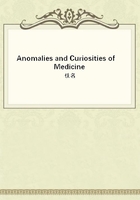
第4章
GENETIC ANOMALIES.
Menstruation has always been of interest, not only to the student of medicine, but to the lay-observer as well. In olden times there were many opinions concerning its causation, all of which, until the era of physiologic investigation, were of superstitious derivation. Believing menstruation to be the natural means of exit of the feminine bodily impurities, the ancients always thought a menstruating woman was to be shunned; her very presence was deleterious to the whole animal economy, as, for instance, among the older writers we find that Pliny remarks: "On the approach of a woman in this state, must will become sour, seeds which are touched by her become sterile, grass withers away, garden plants are parched up, and the fruit will fall from the tree beneath which she sits." He also says that the menstruating women in Cappadocia were perambulated about the fields to preserve the vegetation from worms and caterpillars. According to Flemming, menstrual blood was believed to be so powerful that the mere touch of a menstruating woman would render vines and all kinds of fruit-trees sterile. Among the indigenous Australians, menstrual superstition was so intense that one of the native blacks, who discovered his wife lying on his blanket during her menstrual period, killed her, and died of terror himself in a fortnight. Hence, Australian women during this season are forbidden to touch anything that men use. Aristotle said that the very look of a menstruating woman would take the polish out of a mirror, and the next person looking in it would be bewitched.
Frommann mentions a man who said he saw a tree in Goa which withered because a catamenial napkin was hung on it. Bourke remarks that the dread felt by the American Indians in this respect corresponds with the particulars recited by Pliny. Squaws at the time of menstrual purgation are obliged to seclude themselves, and in most instances to occupy isolated lodges, and in all tribes are forbidden to prepare food for anyone save themselves. It was believed that, were a menstruating woman to step astride a rifle, a bow, or a lance, the weapon would have no utility. Medicine men are in the habit of making a "protective"clause whenever they concoct a "medicine," which is to the effect that the "medicine" will be effective provided that no woman in this condition is allowed to approach the tent of the official in charge.
Empiricism had doubtless taught the ancient husbands the dangers of sexual intercourse during this period, and the after-results of many such connections were looked upon as manifestations of the contagiousness of the evil excretions issuing at this period.
Hence at one time menstruation was held in much awe and abhorrence.
On the other hand, in some of the eastern countries menstruation was regarded as sacred, and the first menstrual discharge was considered so valuable that premenstrual marriages were inaugurated in order that the first ovum might not be wasted, but fertilized, because it was supposed to be the purest and best for the purpose. Such customs are extant at the present day in some parts of India, despite the efforts of the British Government to suppress them, and descriptions of child-marriages and their evil results have often been given by missionaries.
As the advances of physiology enlightened the mind as to the true nature of the menstrual period, and the age of superstition gradually disappeared, the intense interest in menstruation vanished, and now, rather than being held in fear and awe, the physicians of to-day constantly see the results of copulation during this period. The uncontrollable desire of the husband and the mercenary aims of the prostitute furnish examples of modern disregard.
The anomalies of menstruation must naturally have attracted much attention, and we find medical literature of all times replete with examples. While some are simply examples of vicarious or compensatory menstruation, and were so explained even by the older writers, there are many that are physiologic curiosities of considerable interest. Lheritier furnishes the oft-quoted history of the case of a young girl who suffered from suppression of menses, which, instead of flowing through the natural channels, issued periodically from vesicles on the leg for a period of six months, when the seat of the discharge changed to an eruption on the left arm, and continued in this location for one year; then the discharge shifted to a sore on the thumb, and at the end of another six months again changed, the next location being on the upper eyelid; here it continued for a period of two years.
Brierre de Boismont and Meisner describe a case apparently identical with the foregoing, though not quoting the source.
Haller, in a collection of physiologic curiosities covering a period of a century and a half, cites 18 instances of menstruation from the skin. Parrot has also mentioned several cases of this nature. Chambers speaks of bloody sweat occurring periodically in a woman of twenty-seven; the intervals, however, were occasionally but a week or a fortnight, and the exudation was not confined to any one locality. Van Swieten quotes the history of a case of suppression of the menstrual function in which there were convulsive contractions of the body, followed by paralysis of the right arm. Later on, the patient received a blow on the left eye causing amaurosis; swelling of this organ followed, and one month later blood issued from it, and subsequently blood oozed from the skin of the nose, and ran in jets from the skin of the fingers and from the nails.